12 Best Corporate Travel Agencies in the World

Should Your Company Be Using a Corporate Travel Agency?
These days it seems as-if a new corporate travel agency is popping up every week. There are now so many options out there that it's becoming hard to keep up with all of it. Since we are in such a unique position and have great insight into the industry, we figured we would put the major companies here for you to analyze. Take a look at our top choices and see if one (or more) of them is the right fit for your company.

For many companies, corporate travel isn’t just about getting from point A to point B. It’s about arriving on time and refreshed, ready to drive business, build relationships, and close deals. After all, missed connections can mean missed opportunities, impacting revenue and reputation.
With so much on the line, organizations often turn to a business travel provider or corporate travel software to streamline itineraries and secure discounts on essentials like flights and hotels, helping to make work trips smoother and more manageable for employees.
In this guide, we’ll highlight six of the industry’s best corporate travel agencies and what makes them stand out. We’ll also explain how they differ from travel management companies (TMCs). If you're looking for the best agency specifically for small businesses, check this page.

Top 12 Corporate Travel Agencies - Ranked
#1 - Engine.com
⭐️⭐️⭐️⭐️⭐️ 4.7 with 3,064 Reviews
iOS / Android
Workforce Lodging - Group Booking - Flights & Transportation - Rewards Program - Great for SMB


Engine.com is a business travel platform purpose-built to streamline lodging for teams, field workers, and traveling professionals. Unlike traditional travel management companies that focus heavily on flights or concierge services, Engine’s core strength is in workforce lodging, especially for companies booking hotel rooms for job sites, traveling crews, client projects, or extended stays.
The platform is entirely free to join, with no contracts, fees, or onboarding delays. Users simply sign up with a work email to gain access to Engine’s network of over 750,000 hotel properties worldwide, often at rates discounted up to 60% off retail. These are pre-negotiated corporate rates that wouldn’t be accessible via traditional consumer travel websites.
What makes Engine particularly stand out is how deeply it integrates with finance and operations needs. Every booking can be tracked by department, job code, or individual, making reconciliation easier for accounting teams. Admins can issue virtual cards, set travel policy rules, and manage centralized billing all from one dashboard. The system is designed to eliminate tedious manual work like credit card authorization forms, paper invoices, and expense back-and-forths.
In 2024, Engine expanded its offering beyond hotel lodging to include flight booking, rental car reservations, and group travel coordination. This makes it a viable all-in-one tool for many teams, especially those managing travel for events, trainings, installations, or multi-city job sites. Engine also supports Direct Bill programs and incidentals coverage, making it especially attractive for companies who want to minimize employee out-of-pocket spend.
The platform’s rewards system, called Engine Rewards, adds an extra layer of value by allowing users to stack rewards on top of points from major hotel loyalty programs. Users can redeem their Engine points for future travel or free nights.
With 24/7 U.S.-based support, a clean, intuitive interface, and a pricing model designed for efficiency rather than upsell, Engine has become a go-to solution for thousands of companies that need a no-nonsense, high-performance booking platform that emphasizes savings, visibility, and control.
Strengths
- Access to 750,000+ hotels with deep B2B rates
- Full virtual card support and centralized billing
- Booking by department, job code, or event
- Rewards program stacks with Marriott, Hilton, and IHG
- Newly added flights and car rentals
- Direct Bill, incidentals, and policy enforcement tools
- No setup fees, contracts, or platform fees
- Dedicated trip managers for group blocks
- Earn rewards and hotel points at the same time
- U.S.-based support available 24/7
#2 - TravelPerk
⭐️⭐️⭐️⭐️⭐️ 4.7 with 750 Reviews
iOS / Android
Fast & Flexible Booking - Remote-first Teams - Growing Fast
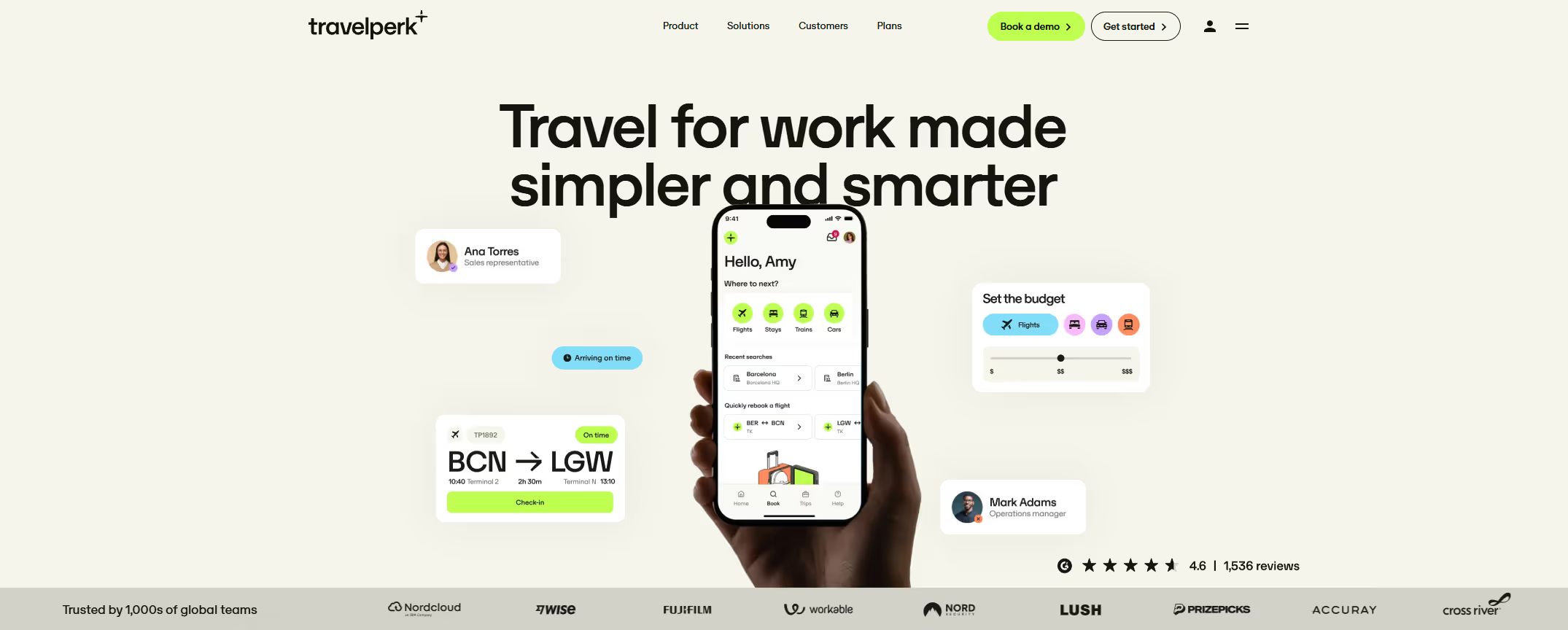
TravelPerk is a fast-growing travel management platform known for its user-friendly design, full-service booking capabilities, and flexible features aimed at small to mid-sized companies. It combines flights, hotels, trains, and rental car bookings in a single interface while offering add-ons like travel policy enforcement, carbon tracking, and automated approvals.
The platform appeals particularly to startups and growing companies due to its quick onboarding and modern integrations with tools like Slack, BambooHR, and Expensify. TravelPerk also offers a feature called FlexiPerk, which allows travelers to cancel most bookings for a partial refund—adding an extra layer of flexibility during uncertain times.
Strengths
- Unified booking for all major travel categories
- Easy-to-use interface and fast deployment
- Integrated expense and travel policy controls
- Marketplace of third-party services (insurance, lounge access, etc.)
- Strong carbon tracking and sustainability tools
Weaknesses
- Hotel bookings often don’t earn loyalty points
- Support quality can vary by plan and region
- May not offer deep reporting for large enterprises
- Not optimized for high-volume or global enterprise accounts
#3 - BCD Travel
⭐️⭐️⭐️⭐️⭐️ 4.6 with 12.8k Reviews
iOS / Android
Enterprise-level Risk Management - Data-driven Policy Enforcement

BCD Travel is a long-established travel management company with a presence in over 100 countries. Designed primarily for enterprise-level clients, BCD offers a wide range of features including duty-of-care systems, advanced spend analytics, and configurable policy enforcement tools. It’s well-suited for companies with complex travel structures, compliance needs, and global coverage.
The platform also includes custom payment processing options, sustainability tracking, and benchmarking tools to evaluate and refine travel policies. However, its legacy infrastructure can sometimes feel rigid or less modern compared to newer, software-driven solutions.
Strengths
- Trusted global TMC with a broad client base
- Strong safety and traveler risk management tools
- Advanced analytics and spend tracking
- Sustainable travel features and reporting
- Customizable workflows for complex organizations
Weaknesses
- User interface feels outdated compared to newer platforms
- Implementation timelines can be lengthy
- Mixed customer service reviews from end users
- Not ideal for small or fast-moving teams
#4 - American Express Global Business Travel (Amex GBT)
⭐️⭐️⭐️⭐️ 4.2 with 994 Reviews
iOS / Android
Premium Global Service - Loyalty Perks - Enterprise Integrations - Global Brand
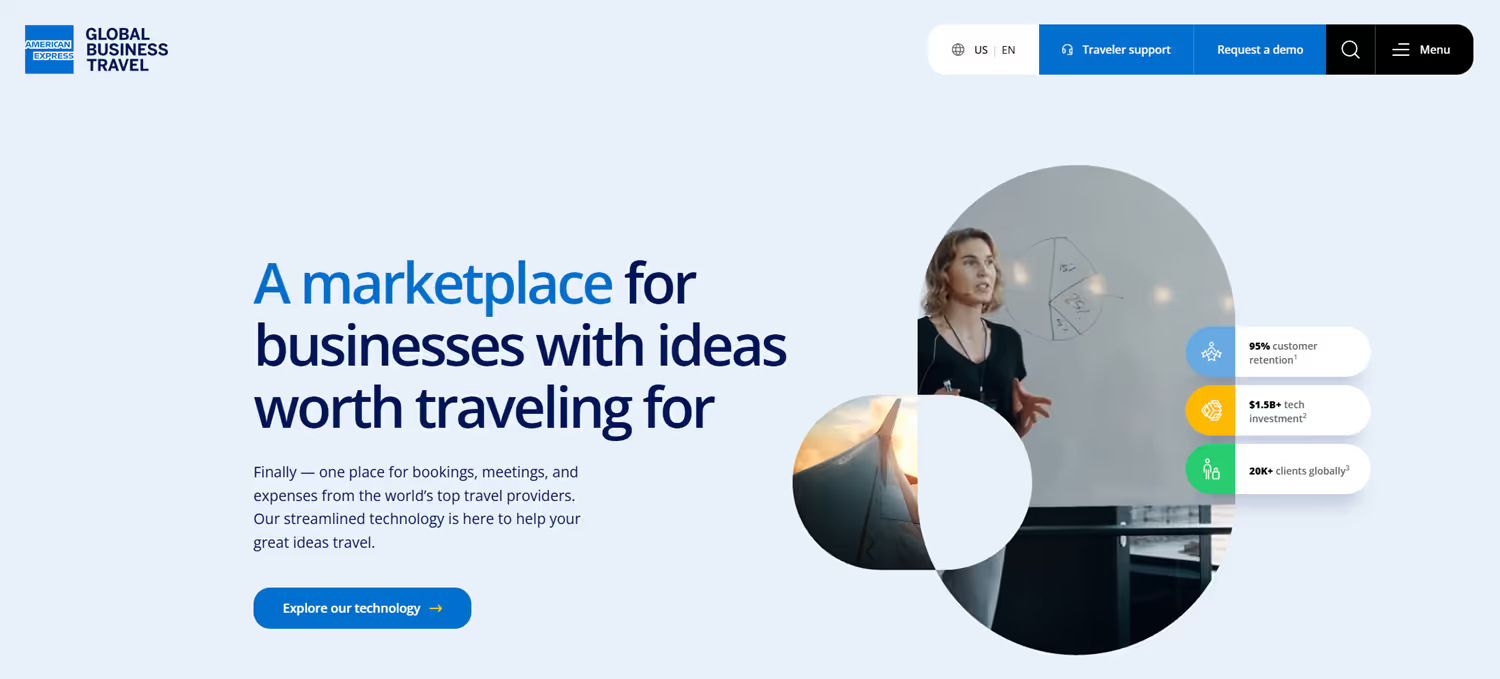
Amex GBT is one of the largest corporate travel agencies in the world, supporting businesses of all sizes with flight, hotel, car, and meeting services across 140+ countries. Known for premium service and elite travel perks, Amex GBT offers clients access to upgrades, loyalty benefits, and white-glove support.
The platform is especially strong for large corporations with complex global travel policies. It integrates with major HR, finance, and ERP systems and provides in-depth reporting and risk management features. While its scale is a major advantage, it also comes with the challenges of complexity and higher costs.
Strengths
- Comprehensive global coverage and supplier relationships
- Access to premium perks and exclusive rates
- Powerful integration with enterprise software
- Excellent for managing complex, multinational travel
- Strong reputation and trust among corporate clients
Weaknesses
- Expensive compared to newer platforms
- Less agile and slower to implement
- User interface and tools can feel complex
- Not ideal for smaller or mid-size businesses
- Poor Website UI
#5 - FCM Travel Solutions
⭐⭐️ 2.0 with 54 Reviews
iOS / Android
Personalized Consulting - Global Coverage

FCM Travel Solutions is a global TMC owned by Flight Centre Travel Group. It blends high-touch service with modern travel technology and supports businesses in over 100 countries. FCM’s platform allows for real-time bookings, traveler tracking, and policy compliance, while its consultants provide a personalized, consultative approach to optimizing travel programs.
The company is known for its global scale, but it’s also praised for adapting well to local market needs. Clients benefit from negotiated air and hotel rates, sustainability programs, and benchmarking services. While it doesn’t move as quickly as software-first platforms, FCM maintains a strong position for businesses needing a blend of service and tech.
Strengths
- Global support with strong local expertise
- Personalized consulting and travel program review
- Competitive pricing through large supplier network
- Real-time travel tracking and approvals
- Flexible solutions for both mid-size and large businesses
Weaknesses
- Not as fast or self-service oriented as modern SaaS tools
- Mixed support quality depending on the region
- Onboarding and training can be time-intensive
- Less appeal to startups or low-volume travelers
#6 - TravelBank
⭐️⭐️⭐️⭐️⭐️ 4.5 with 4.7k Reviews
iOS / Android
Affordable Travel - Expense Management for Startups & Small Teams

TravelBank is a modern travel and expense management tool that’s designed with startups and SMBs in mind. It combines booking, budgeting, virtual cards, and reimbursements in one easy-to-use platform. Its standout feature is its employee incentive model: travelers are rewarded for choosing lower-cost travel options, helping companies cut costs without heavy-handed restrictions.
The platform is mobile-friendly and quick to adopt, making it ideal for distributed or remote-first teams. It’s also a popular choice for finance departments seeking better expense tracking. However, it lacks some of the deep customization and global capabilities of larger TMCs.
Strengths
- Affordable, all-in-one travel and expense platform
- Incentive-based savings encourages smart travel choices
- Clean, modern interface with quick learning curve
- Built for remote teams and small-to-mid businesses
- Integrates with accounting tools like QuickBooks and NetSuite
Weaknesses
- Limited features for complex or global programs
- Basic analytics compared to larger providers
- Less negotiation power for deep hotel or airfare discounts
- Not built for enterprise-level travel policies
#7 – itilite
⭐️⭐️⭐️ 3.3 with 184 Reviews
iOS / Android
Workforce Travel Booking - Expense Management - Corporate Card Integration - Policy Compliance Tools
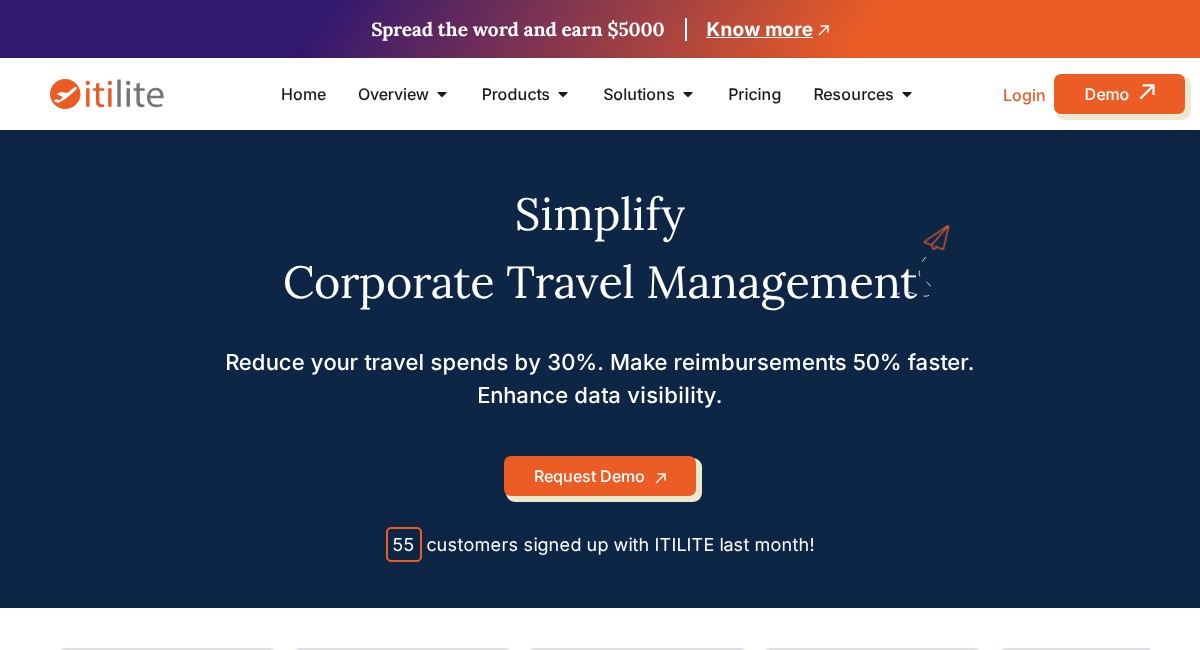
itilite is a comprehensive travel and expense management platform designed to simplify corporate travel for businesses of all sizes, particularly those with frequent travelers. It integrates booking for flights, hotels, and car rentals into a single interface, leveraging AI for personalized recommendations and policy enforcement. With a focus on cost savings and efficiency, itilite offers real-time approvals, automated reimbursements, and detailed analytics to optimize spending. The platform is ideal for growing companies seeking to reduce administrative burdens while ensuring compliance and traveler satisfaction.
Strengths:
- User-friendly interface with seamless mobile app for on-the-go bookings and expense tracking.
- AI-driven insights for cost optimization, including highlighting budget-friendly options and policy-compliant choices.
- Strong integration with corporate cards and accounting systems like NetSuite or Xero for automated reconciliation.
- Excellent customer support with quick resolutions and incentives like cashback on travel spends.
- Comprehensive features like fraud detection, multi-currency support, and virtual cards for secure payments.
Weaknesses:
- Higher pricing on some bookings compared to direct aggregators, requiring careful comparison.
- Occasional lag in the mobile app or interface, especially for new users.
- Limited advanced customization for very large enterprises without additional setup.
#8 - SAP Concur
⭐️⭐️⭐️⭐️⭐️ 4.5 with 1.1m Reviews
iOS / Android
Expense Management - For Large Companies - Business Travel Booking - Invoice Automation - Compliance Tools
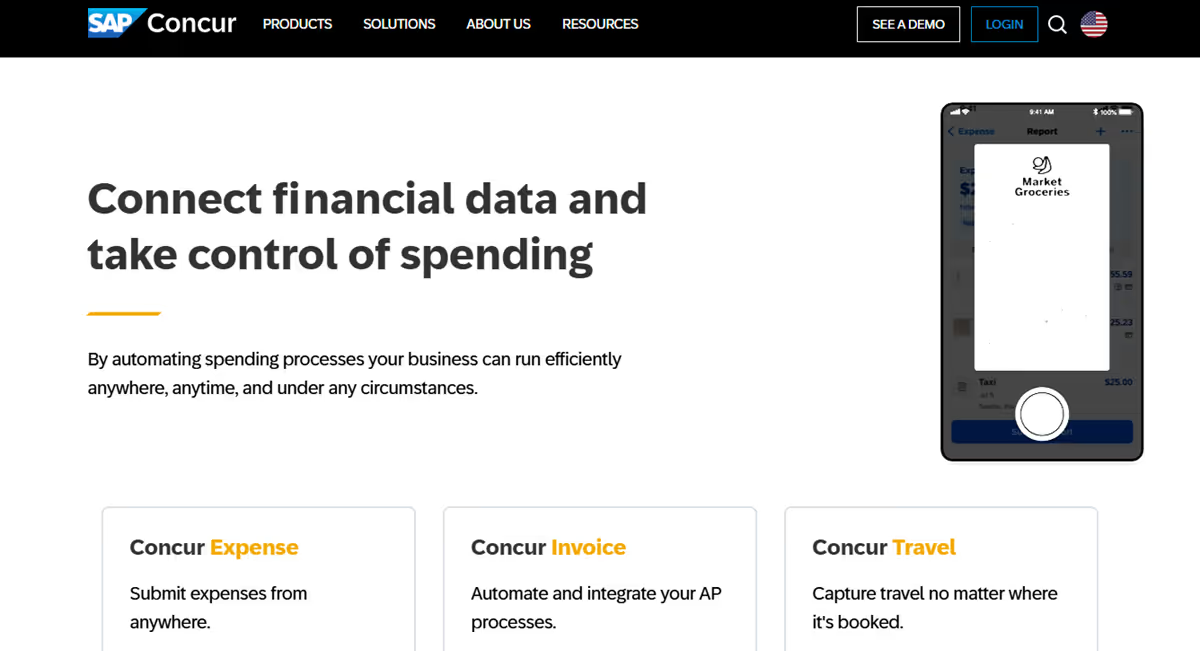
SAP Concur is a robust platform for managing corporate travel, expenses, and invoices, tailored for large organizations aiming for visibility and control over spending. It automates expense reporting, integrates with ERP systems, and provides tools for policy enforcement and real-time analytics. With features like AI-driven anomaly detection and mobile receipt capture, it streamlines reimbursements and supports global compliance, making it suitable for companies with international operations and complex financial needs.
Strengths:
- Comprehensive integration of travel booking, expense tracking, and invoicing in one cloud-based system.
- Advanced AI for fraud detection, policy compliance, and predictive spend analytics to optimize budgets.
- Mobile app for easy receipt capture, approvals, and travel updates, enhancing user productivity.
- Strong global support with multi-currency and multi-language capabilities for international teams.
- Detailed reporting and duty-of-care features, including traveler tracking during disruptions.
Weaknesses:
- Steep learning curve and less intuitive interface, often requiring training for new users.
- Outdated user experience in some areas, with reports of slower processing during peak times.
- Higher costs for full implementation, especially for smaller businesses without scaled needs.
#9 - Navan
⭐️⭐️⭐️⭐️⭐️ 4.7 with 17.7k Reviews
iOS / Android
For Large & Enterprise Companies - Travel Booking - Expense Automation - Corporate Cards - AI Insights
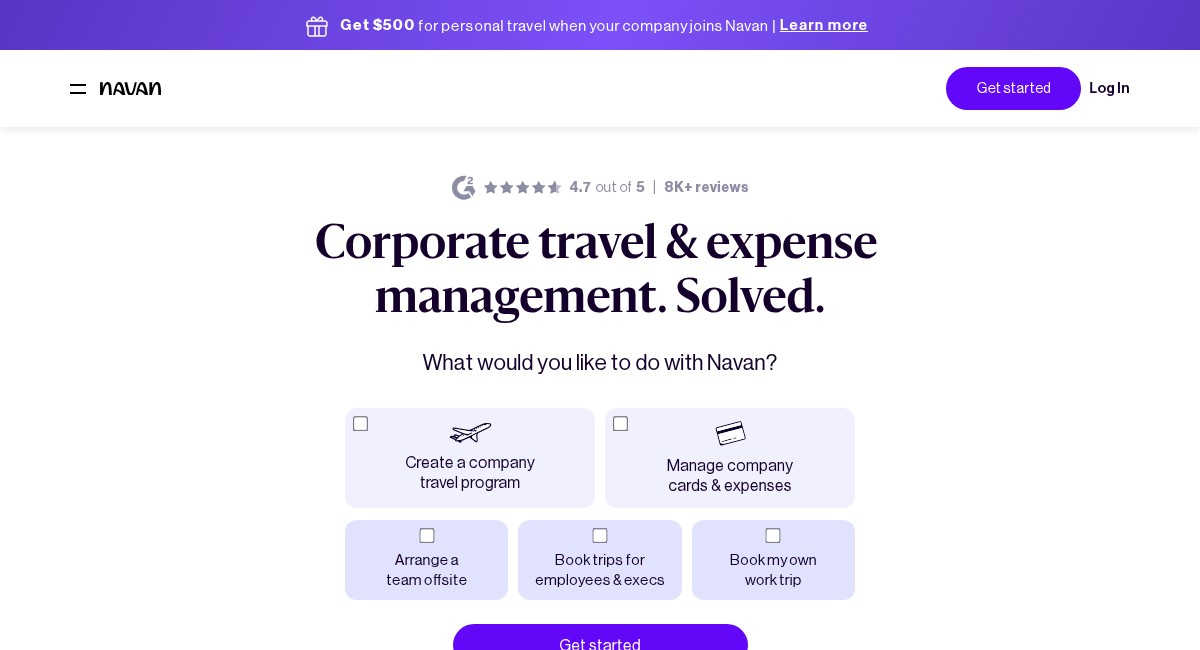
Navan is an AI-powered platform that unifies corporate travel booking, expense management, and payments, targeting businesses seeking efficiency and savings. Formerly TripActions, it emphasizes user-friendly experiences with personalized recommendations and incentives for cost-effective choices. Suitable for dynamic teams, Navan streamlines approvals, reimbursements, and reporting while supporting sustainability goals through eco-friendly options.
Strengths:
- Intuitive app and interface for quick bookings, expense tracking, and real-time updates.
- AI features like Ava for personalized travel suggestions and automated policy compliance.
- Integrated corporate cards with cashback and seamless reconciliation for better spend control.
- 24/7 support and group travel tools for coordinated trips and bulk discounts.
- Strong analytics for identifying savings and trends, boosting productivity.
Weaknesses:
- Inconsistent pricing, sometimes higher than direct bookings or competitors.
- Occasional glitches in the app, like map resets or limited refund options.
- Less customization for very large enterprises without additional integrations.
#10 - Egencia
⭐️⭐️⭐️⭐️⭐️ 4.5 with 50.7k Reviews
iOS / Android
Business Travel Booking - Expense Reporting - Itinerary Management - Analytics Studio

Egencia, powered by Expedia Group and part of Amex GBT, offers a modern corporate travel platform for streamlined bookings and compliance. It integrates flights, hotels, and rentals with policy tools and real-time updates, targeting companies focused on traveler well-being and ROI. With AI search and analytics, it's designed for global teams needing efficient, consumer-like experiences.
Strengths:
- Unified platform with vast inventory and NDC capabilities for competitive rates.
- Intuitive mobile app for bookings, updates, and expense submissions on the go.
- Advanced reporting and duty-of-care features, including traveler tracking in emergencies.
- Strong policy enforcement and add-ons like visa support for hassle-free travel.
- High satisfaction in customer service and integration with expense systems.
Weaknesses:
- Complex setup and onboarding, often requiring IT support.
- Mobile app lacks some desktop features, limiting on-the-go functionality.
- Occasional integration issues with third-party HR or expense tools.
#11 - CWT
⭐️⭐️⭐️⭐️⭐️ 4.5 with 13.8k Reviews
iOS / Android
Business Travel Solutions - Meetings and Events - Spend Management - Sustainability Tools
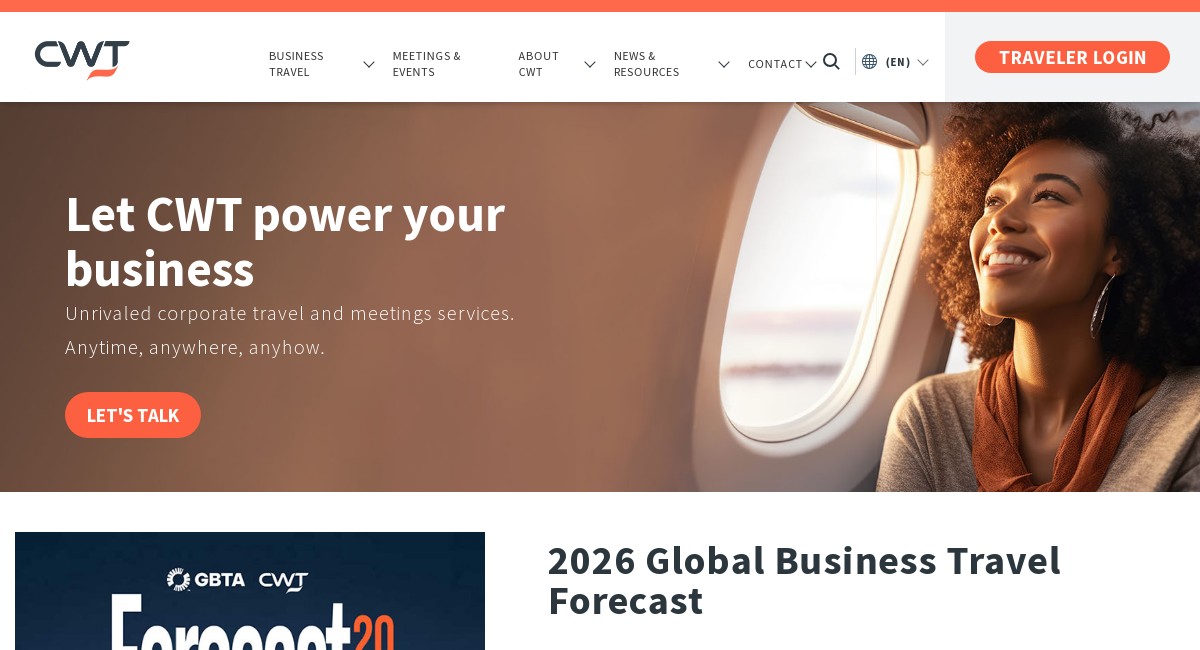
CWT (formerly Carlson Wagonlit Travel) delivers tailored corporate travel management for global businesses, emphasizing employee experience and sustainability. It offers booking, expense tracking, and event planning with tools for policy compliance and risk management. Ideal for large organizations, CWT focuses on data-driven insights and personalized support to optimize programs.
Strengths:
- Comprehensive services including meetings, events, and B2B4E focus for employee satisfaction.
- Strong global network with 24/7 support and safety features like International SOS integration.
- Advanced analytics for budgeting, forecasting, and sustainable travel choices.
- Flexible APIs and integrations for seamless expense and invoice management.
- Proven expertise in high-risk industries like energy and media.
Weaknesses:
- Inconsistent service quality across regions, with varying agent responsiveness.
- Higher costs for some bookings and occasional outdated interface elements.
- Limited self-service options in the app compared to newer competitors.
#12 - CTM Travel
⭐️⭐️⭐️ 3.0 with 27 Reviews
iOS / Android
Global Travel Solutions - Event Management - Budget Control - Technology Integration
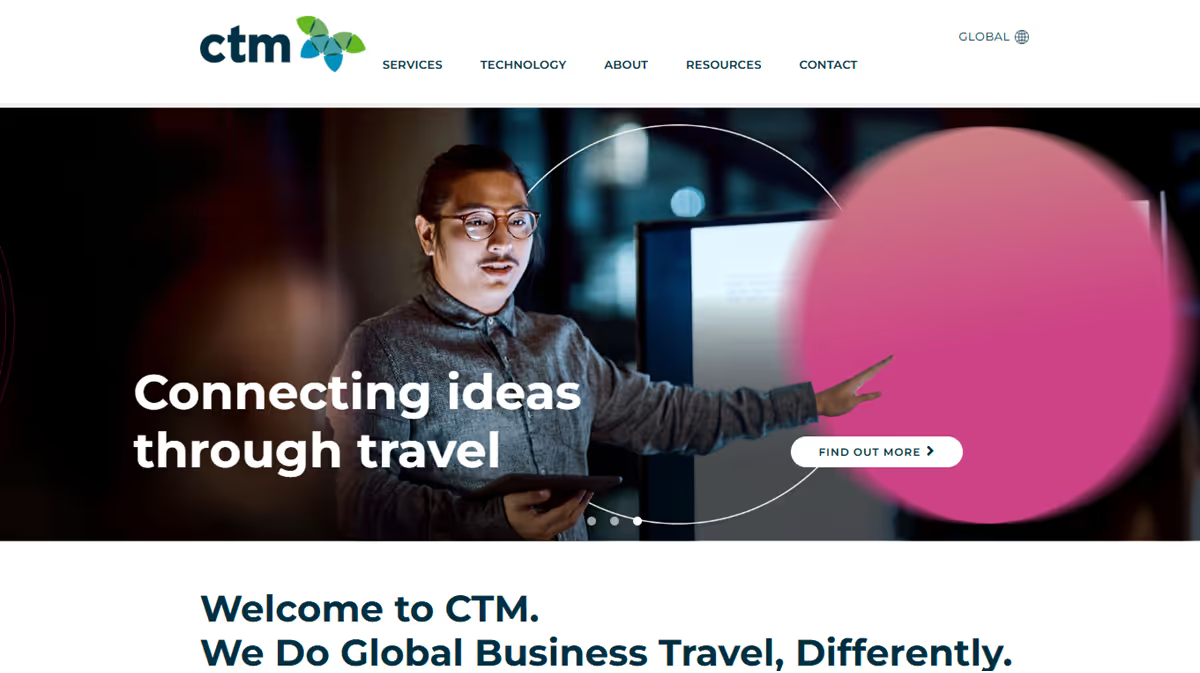
CTM Travel provides innovative corporate travel management with a focus on cost savings, safety, and customization. It supports bookings, events, and analytics for businesses worldwide, leveraging local expertise and tech for efficient programs. Suitable for companies prioritizing strategic results and traveler productivity.
Strengths:
- Personalized service with dedicated managers and 24/7 support for complex needs.
- Strong emphasis on sustainability and ROI through data insights and policy tools.
- Integrated platform for bookings, expenses, and events with global supplier relationships.
- High employee engagement through training and recognition programs.
- Proven recovery and innovation post-pandemic, with optimistic growth outlook.
Weaknesses:
- Inconsistent online booking tool reliability and limited code-sharing options.
- Poor customer service in some regions, with delays in responses.
- Higher costs and less competitive rates compared to direct bookings.


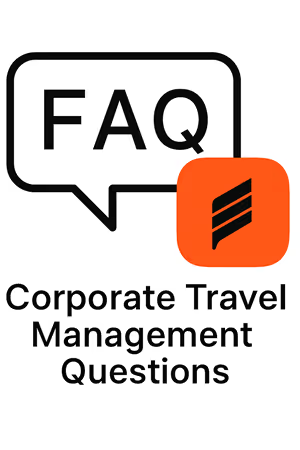
Frequently Asked Questions Relating to Corporate Travel Agencies
Question: What is a corporate travel agency?
Answer:
A corporate travel agency is a company or platform that helps businesses book and manage travel for their employees. These agencies usually provide access to discounted rates on flights, hotels, and rental cars, and offer tools for enforcing travel policies, tracking spending, and supporting travelers on the road.
Question: Why would a company use a corporate travel agency?
Answer:
Companies use corporate travel agencies to save time, reduce costs, and improve oversight. Instead of employees booking travel on consumer websites, a centralized system ensures policy compliance, simplifies approvals, and provides better visibility into travel expenses. Agencies can also offer 24/7 support, negotiated rates, and consolidated billing.
Question: What is a corporate travel manager? What do they do?
Answer:
A corporate travel manager oversees a company’s travel program. Their job typically includes selecting travel providers, enforcing travel policies, managing vendor relationships, tracking budgets, and ensuring travelers are supported while on the road. They also analyze travel spend and look for opportunities to save money or improve efficiency.
Question: Why are virtual business credit cards better for corporate travel?
Answer:
Virtual business credit cards offer more control and security than traditional cards. They can be issued for individual bookings, set with spending limits, and linked to specific job codes or departments. This helps prevent fraud, simplifies reconciliation, and eliminates the need for employees to use personal cards or submit reimbursement forms.
Question: Why do companies need a corporate travel policy?
Answer:
A corporate travel policy sets clear guidelines for how employees should book, pay for, and report travel. It ensures consistency, controls costs, improves safety, and prevents last-minute bookings or unauthorized upgrades. A well-written policy also helps the company stay compliant with tax and accounting regulations.
Question: What do corporate travel agents do?
Answer:
Corporate travel agents help employees and travel managers book flights, hotels, and other services according to company policies. They assist with itinerary changes, cancellations, and rebookings, and often provide support during travel disruptions. Some agents also specialize in group travel or VIP services.
Question: What does a corporate travel consultant do?
Answer:
Corporate travel consultants advise companies on how to structure and optimize their travel programs. They may assist with vendor selection, policy creation, contract negotiation, benchmarking, and performance analysis. Their goal is to help businesses reduce costs, improve traveler satisfaction, and streamline travel operations.
Question: What is corporate incentive travel?
Answer:
Corporate incentive travel refers to trips that companies provide as a reward for top-performing employees, sales teams, or business partners. These trips are often all-expense-paid and may include luxury accommodations, group activities, and exclusive experiences. Incentive travel is used to boost morale, motivate teams, and strengthen relationships.
Question: Are travel expenses tax deductible for corporations?
Answer:
Yes, most business travel expenses are tax deductible for corporations, including airfare, hotels, transportation, and meals. However, the travel must be directly related to business activities, and companies must maintain proper documentation. Entertainment and personal expenses are generally not deductible. It’s always best to consult with a tax professional.





.jpg)







.avif)
















.jpg)



.avif)






